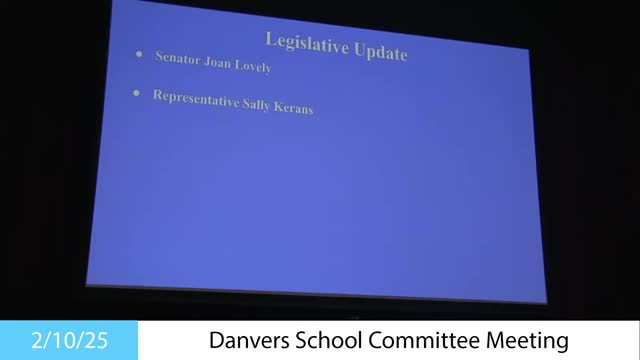State legislators brief Danvers on Emergency Assistance funding, bus-camera pilot and circuit-breaker push
Get AI-powered insights, summaries, and transcripts
Subscribe
Summary
Sen. Joan Lovely and Rep. Sally Kearns updated the Danvers School Committee on a pending supplemental budget for Emergency Assistance (EA), efforts to raise special-education circuit-breaker and transportation reimbursement levels, and a school-bus camera pilot that towns may opt into.
Senator Joan Lovely and Representative Sally Kearns told the Danvers School Committee on Feb. 11 that the Legislature is considering a supplemental budget to extend Emergency Assistance (EA) payments through the end of the fiscal year and to refine eligibility rules. The legislators said the House passed a package with new caps and eligibility requirements and that the Senate expected to consider the EA supplemental in informal session on Thursday, after a short amendment deadline.
Lovely said the EA program was designed in the early 1980s as an emergency shelter system for families and that recent increases in families seeking assistance had led lawmakers to pursue tighter eligibility rules while funding the system through the current fiscal year. She said about 60% of current EA participants are Massachusetts families and about 40% are documented asylum seekers; the supplemental the House passed contains caps and further requirements intended to reduce program size to a level lawmakers view as sustainable.
Representative Kearns described a pilot of the School Bus Safety Enforcement Act that places cameras on buses in Peabody (and Salem), capturing nearly 3,412 vehicles failing to stop for 10 camera-equipped buses between September and May in one town. She said the new law removes a state-level obstacle to placing cameras on school buses; towns must opt in, and the fines would be assessed against the vehicle owner and return to the community as revenue. Kearns said the pilot showed thousands of violations and that the change allows municipalities to choose to install exterior cameras and related software without requiring a special town vote.
Both legislators urged continued partnership with districts, and Danvers Superintendent Dan (identified in the meeting only by first name) thanked them for advocacy on behalf of districts that are educating students displaced by motel sheltering and other homelessness responses. Danvers leaders reiterated interest in two specific state funding priorities discussed at the meeting: raising the effective reimbursement rate for special-education transportation in the circuit-breaker program from a recent earmark (44% in the House proposal) toward 75%, and increasing the chapter 70 foundation amount to deliver additional per-pupil aid.
Kearns and Lovely also raised federal immigration enforcement as a concern for schools and said districts and municipalities are discussing policies and local protocols; both legislators said state authority is limited but that local governments are seeking ways to protect students during school hours. Lovely added a local note that the 250th anniversary of the American Revolution will prompt events in the region and encouraged district involvement.
Why this matters: The EA supplemental affects budget planning for districts that have absorbed children in motel or shelter placements; increased circuit-breaker reimbursement and chapter 70 aid would reduce local fiscal pressure. The bus-camera option provides communities a voluntary enforcement tool that can generate fines and potentially deter vehicles from passing stopped school buses.
